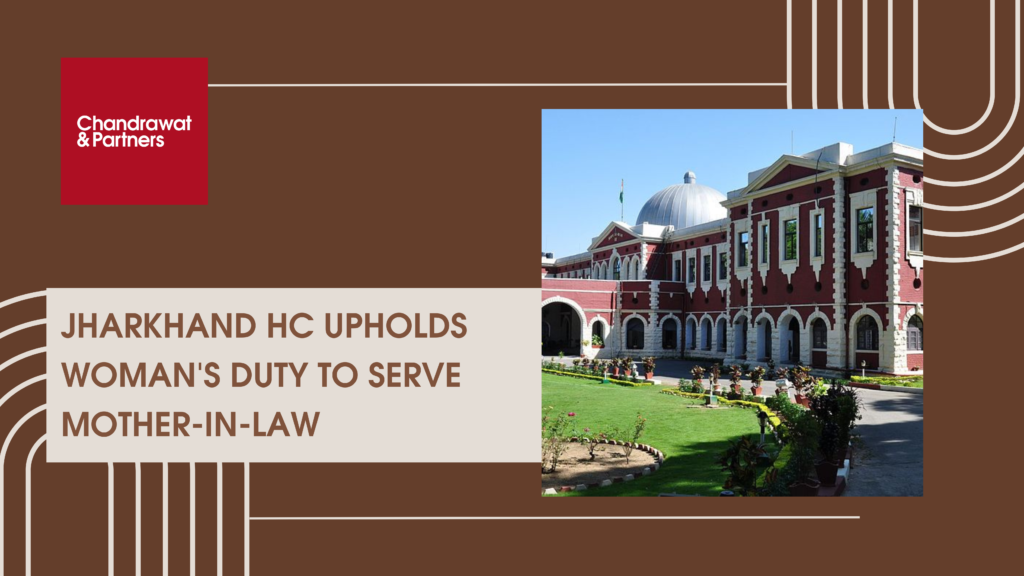Share :
Introduction
At the core of this legal saga lies the recognised traditional duty of Indian women to care for elderly in-laws, as astutely noted by the Jharkhand High Court in the case Rudra Narayan Ray v. Piyali Ray Chatterjee. The court, in its sagacious judgment, not only highlighted the seeming absurdity but also deemed unreasonable a wife’s demand to live separately from her husband’s family. This stance was grounded in the court’s perception of cultural and obligatory duties that have long been embedded in Indian societal norms.
CONSTITUTIONAL FOUNDATION
The court, in grounding its seminal ruling, meticulously anchored its decisions in the rich tapestry of Indian cultural customs and fundamental rights enshrined in the Constitution. The pivotal Clause (f) of Article 51-A of the Indian Constitution came into play, emphasising citizens’ duty “to value and preserve the rich heritage of our composite culture.” This constitutional underpinning provided a solid legal foundation for the court’s subsequent deliberations.
CRIMINAL REVISION AND JUDICIAL SEPARATION
- Criminal Revision Authority:
The court, in a display of judicious authority, opted to partially grant a husband’s criminal revision plea. Criminal revision, a potent legal tool designed to scrutinize trial court decisions, was strategically employed. The court’s intervention was triggered by perceived deviations from established legal principles, where relevant evidence had not been adequately considered or when the use of authority appeared arbitrary or perverse.
- Judicial Separation under Hindu Marriage Act:
The husband’s pursuit of judicial separation under Section 10 of the Hindu Marriage Act added a layer of complexity. The court, with a keen eye on legislative provisions and the specific nuances of the case, orchestrated a delicate legal dance to arrive at a judicious ruling.
COERCION AND INTENT
The court, in its comprehensive analysis, delved into the intricacies of the wife’s departure from the marital residence. Through careful consideration of testimonies, the court concluded that the wife’s voluntary exit stemmed from her perceived inability to care for ageing in-laws. This crucial insight served as the bedrock for the court’s ruling in favour of the husband’s criminal revision plea.
LEGAL PRECEDENT – NARENDRA v. K. MEENA
Drawing on the legal wisdom encapsulated in the Supreme Court’s findings in Narendra v. K. Meena, the Jharkhand High Court underscored the wife’s continuous attempts to coerce her husband into living apart from his family as cruelty. This legal precedent, coupled with the specific dynamics of the case, informed the court’s nuanced ruling and shaped its perspective on the husband’s decision to opt for judicial separation over divorce.
MAINTENANCE DETERMINATION
- Section 125(4) of CrPC:
The court, in consonance with Section 125(4) of the Criminal Procedure Code, rendered a verdict that the wife was not entitled to support due to her decision to live apart from her husband without a valid reason. This legal stance aligns with the court’s commitment to upholding legal principles and ensuring a judicious application of the law.
- Son’s Maintenance Adjustment:
The court, cognizant of the petitioner’s financial situation, displayed a nuanced understanding by adjusting the son’s maintenance from Rs. 15,000 to Rs. 25,000 per month. This bespoke approach, considering the petitioner’s economic capacity, further showcased the court’s commitment to balancing legal guidelines with real-world fiscal considerations.
VERDICT AND IMPLICATIONS
In a judiciously reasoned decision, the court, through its partial granting of the Criminal Revision, meticulously overturned the lower court’s ruling on the wife’s maintenance. The nuanced adjustment of support for the minor son reflects a judicious consideration of financial capacities, thereby setting a precedent for similar cases in the future.
CONCLUSION
This landmark case, now firmly established as a precedent, not only highlights the intricate interplay between cultural expectations, legal obligations, and individual rights in matrimonial disputes but also imparts invaluable insights into the dynamic evolution of family law in India. By navigating the delicate balance between these elements, the case serves as a touchstone for future legal deliberations, shedding light on the nuanced complexities inherent in the ever-evolving landscape of familial relations and legal frameworks within the Indian context.
For more information or queries, please email us at
enquiries@chandrawatpartners.com




